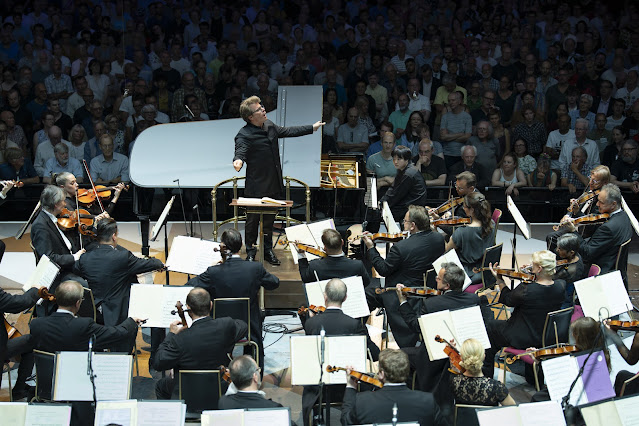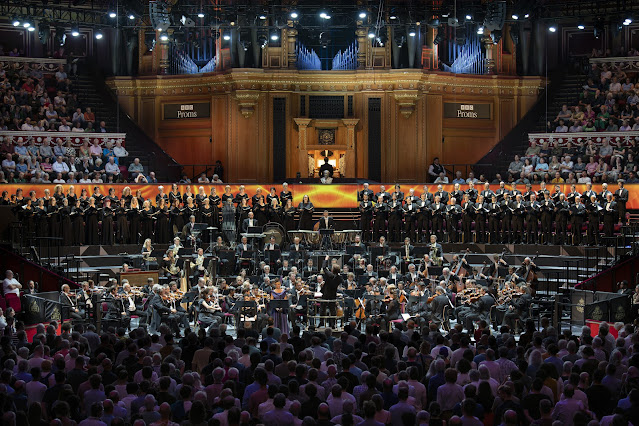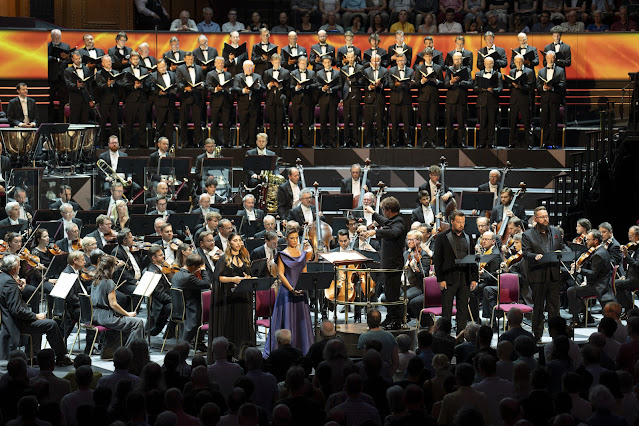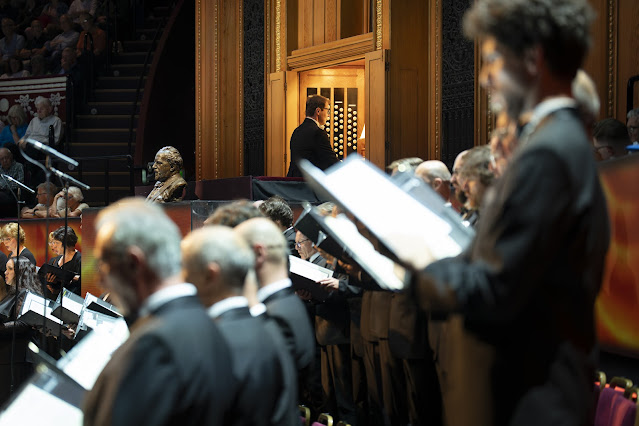 |
| Dvorák: Piano Concerto – Mao Fujita, Czech Philharmonic Orchestra, Jakub Hruša – BBC Proms (Photo: BBC/Andy Paradise ) |
Vítězslava Kaprálová: Military Sinfonietta, Dvořák: Piano Concerto in G minor, Janáček: Glagolitic Mass; Czech Philharmonic Orchestra, Mao Fujita, Corinne Winters, Bella Adamova, David Butt Philip, Pavel Švingr, Christian Schmitt, City of Prague Philharmonic Choir, Jakub Hrůša; BBC Proms at the Royal Albert Hall
Reviewed 28 August 2024
Two rarities and a classic in a prom which showed the Czech orchestra’s superb quality, allied to fine performances and soloists
Jakub Hrůša and the Czech Philharmonic Orchestra returned to the BBC Proms at the Royal Albert Hall on Wednesday 28 August 2024 giving us another treat pairing Czech rarities with something familiar. Their second programme featured the first ever performance at the BBC Proms of Vítězslava Kaprálová’s Military Sinfonietta, Dvořák’s Piano Concerto in G minor with soloist Mao Fujita, and Janáček’s Glagolitic Mass with soloists Corinne Winters (soprano), Bella Adamova (mezzo-soprano), David Butt Philip (tenor) and Pavel Švingr (bass, replacing Brindley Sherratt), plus Christian Schmitt (organ) and the City of Prague Philharmonic Choir.
Vítězslava Kaprálová is one of those figures who blazed brilliantly yet briefly. Born in Brno in 1915, she studied in Brno and Prague, but an encounter with Bohuslav Martinů led her to Paris where she had a long and intense relationship with the composer, both professional and personal. She married the son of Czech painter Alphonse Mucha in 1940, but died in June that year. Her Military Sinfonietta was written whilst she was still a student at Prague Conservatory and the work was written against the backdrop of pressure from Nazi Germany for the Czech Republic to cede territory.
 |
| Janácek: Glagolitic Mass – Corinne Winters, City of Prague Philharmonic Choir, Czech Philharmonic Orchestra, Jakub Hruša – BBC Proms (Photo: BBC/Andy Paradise ) |
She conducted the Czech Philharmonic in the premiere at a gala in Prague in 1937, the first woman to conduct the orchestra. She conducted a performance in London in June 1938 for the International Festival of Contemporary Music, when she became the first woman to conduct the BBC Symphony Orchestra. Rather embarrassingly, given this link, the performance of her Military Sinfonietta is the first time any of her works have been performed at the Proms.
Written for large orchestra, the work demonstrates confident and imaginative handling of the orchestral forces, along with a great sense of style. The opening contrasted fanfare figures with a more sprightly figure that had a distinct Czech tang to it, along with gently lyric moments. The resulting work, lasting over 15 minutes, restlessly explored these components, combining and disturbing. The fanfare and military elements were never long, just enough to disturb so that this felt the least martial of works until the blazing finale. It felt, perhaps, slightly too long, a promising work rather than a masterwork, but alas she never really lived to give us the masterwork.
This was followed by an even more problematic piece, Dvořák’s Piano Concerto, the first of his three concertos and written in 1876. Dvořák was not a particularly good pianist and the concerto was decried from early on by critics of Dvořák’s piano writing. He reworked the score for its premiere in 1878, making the piano part showier, so much so that by the time the work was published in 1883 the part was fiendish and another pianist, Vilem Kurz, made his own edition which has become the standard version.
The soloist, Mao Fujita, won the Silver Medal at the 2019 Tchaikovsky Competition and seemed to make light work of the solo part, finding, in fact an enormous amount of poetry in the piece, perhaps aided by the space that Hrůša gave him as the work took rather longer than Richter does on his recording. There were undbouted felicities throughout the concerto, but I did find that it rambled somewhat as if Dvořák was finding that adding a solo part to an orchestra meant taking twice as long to develop everything.
Hrůša and the orchestra brought a lovely freshness to the opening symphonic introduction and Fujita’s first entry was almost shy, but we had flashes of sturm und drang as the movement developed and some gorgeous passages where Fujita’s piano decorations wove in and out of solos in the orchestra. For all the solo part’s reputation for awkwardness, here Fujita gave it great charm. The slow movement began with a fabulous horn tune and Fujita channelled Chopin in the solo part, giving us some magical moments with a venture into more bravura elements later. There was something almost gypsy-ish in the opening music of a final movement which proved full of contrasts, but was the key culprit for me in the rambling stakes. Hrůša and Fujita brought out the works contrasts, leading to a final mad dash for the finish.
 |
| Janácek: Glagolitic Mass – Bella Adamova, Corinne Winters, David Butt Philip, Pavel Švingr, City of Prague Philharmonic Choir, Czech Philharmonic Orchestra, Jakub Hruša – BBC Proms (Photo: |
After the interval it was Janáček’s Glagolitic Mass with, for me, the novelty of hearing it performed by Czech choral and orchestral forces. Throughout the performance there was something natural and obvious about their handling of the material, complemented I think by the space that Hrůša gave it. This was the least frenetic of performances and as a result the orchestral playing and choral singing lacked the element of desperation that can sometimes creep into performances, so that even the tricky choral entries were finely done.
After an Introduction where we could appreciate the thrilling sense of focus and discipline in the orchestra, the Kyrie showcased the rapt tone of the choir, turning violent and desperate as the movement developed with strong contributions from soprano Corinne Winters. She brought strength and joy to her opening solo in the Gloria, contrasting with delicacy from the orchestra. When the chorus came in they were impressive and thrilling, certainly no anxieties about correct entries here. The contrast between Winter’s strong tone, with a lovely ease at the top, and the delicacy that Hrůša drew from the orchestra was notable. When David Butt Philip entered he brought a ringing top register, and superb ease allied to the right weight so that his performance was not only thrilling but musical and perhaps the best account of the tenor solos that I have heard live.
The choir opened the Credo with terrific rhythmic sense allied to an ease of delivery. Throughout this movement Butt Philip combined wonderful firmness with a thrilling tone, giving a performance of great strength. The way the chorus floated its tone in the repeated ‘Verujus’ was magical, and here we had great contrasts with the vibrant orchestra. It was this sense of contrast that came out, tender, thrilling and disciplined by turns, whether soloists, choir or orchestra, the control was impressive. And we ended the movement with a finely trenchant bass solo from Pavel Švingr.
The delicate orchestral colours at the opening of the Sanctus made the movement almost a dance, and the soloists made their contributions strong yet with deceptive ease to these sometimes awkwardly written parts. As the movement developed so did the intensity with some thrilling moments from the choir and impressive discipline from the soloists. The orchestral introduction to the Agnus Dei was positively eerie, a tone matched by the hushed chorus, though their climax thrilled too, with an intense moment for the soloists.
 |
| Janácek: Glagolitic Mass – Christian Schmitt, City of Prague Philharmonic Choir, Czech Philharmonic Orchestra, Jakub Hruša – BBC Proms (Photo: |
Having made his contributions to the previous movements rather discreet, Christian Schmitt seemed to revel in the way he could let rip with the Royal Albert Hall organ, putting the instrument through its paces both in terms of the flurries of notes and the sheer volume towards the end. The final orchestral Intrada simply seemed to continue this with fast, vivid playing.
You can hear the full concert on BBC Sounds until 30 days after the end of the BBC Proms.
The blog is free, but I’d be delighted if you were to show your appreciation by buying me a coffee.
Elsewhere on this blog
- Prom 49: A consumate & deeply felt account of Suk’s Asrael Symphony crowns the Czech Philharmonic’s first Prom appearance – concert review
- Far from special interest: discs of brass band music by Arthur Bliss and Malcolm Arnold, two brilliant and highly satisfying portraits – record review
- Into the unknown: soprano Aoife Miskelly makes her debut with Vache Baroque in Pergolesi’s rarely performed opera, L’Olimpiade – interview
- Responses to Thomas Hardy: composer
Arthur Keegan’s complex web of music new and old, atmospherically
performed by Lotte Betts-Dean, James Girling & Ligeti Quartet – record review - Prom 40: Transcending limitations, Bach’s St John Passion from Masaaki Suzuki and Bach Collegium Japan – concert review
- Prom 37: intense contrasts thundering cannonades to personal intimacy, Antonio Pappano conducts Britten’s War Requiem – concert review
- Music is the best argument for its continued existence: John Largess of one of the USA’s most celebrated quartets, the Miró Quartet – interview
- More Buffy the Vampire Slayer than German Romanticism: Gothic Opera’s Der Vampyr at the Grimeborn Festival – opera review
- Substantial and satisfying listening: Stuart Hancock’s score for the new film, Kensuke’s Kingdom – record review
- White-hot dramatic impetus: Meyerbeer’s Le prophète on LSO Live uses a traditional version but captures the work’s essential drama – record review
- Songs from two golden ages: Nicholas Mulroy, Elizabeth Kenny & Toby Carr in a recital of effortless beauty – record review
- Everything is connected: Barbican Quartet on their debut album, Manifesto on Love, on Genuin label – interview
- Vivacity, humour & pathos: Opera Holland Park & Charles Court Opera in Gilbert & Sullivan’s The Yeomen of the Guard – opera review
- Home


.jpg?w=998&resize=998,665&ssl=1)



%20Craig%20Fuller.jpg?w=160&resize=160,160&ssl=1)



